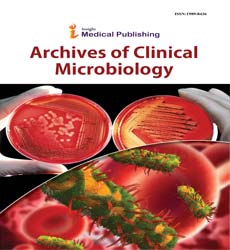Abstract
Antimicrobial Susceptibility Profiles of Gram-Negative Bacilli and Gram-Positive Cocci Isolated from Cancer Patients in Libya
Background: Due to defects in their immunity cancer patients are prone to serious infections with substantial morbidity and mortality. However, there is lack of information on the microbial and antimicrobial susceptibility profiles of microorganisms associated with infections in cancer patients in Libya.
Methods and Findings: Organisms were isolated from sputum, throat swabs, skin infection swabs (SI), high vaginal swabs (HVS), urine and blood specimens from the cancer patients in the African Oncology Hospital (AOC) at the time an infection occurred. Isolated bacteria were identified to the species level and tested for their susceptibility to a variety of antimicrobial agents by an automated microbiology system. During the study period (January-December 2009) 256 organism (196 Gram-negative bacilli [GNB] and 60 Gram-positive cocci [GPC]) were isolated from cancer patients. The most common GNB identified were Escherichia coli (53%), Klebsiella pneumoniae (19.4%) and Pseudomonas aeruginosa (10.2%). We observed resistance rates between 36-73% among GNB to ampicillin, amoxycillin-clavulanic acid, piperacillin, tetracycline and trimethoprim-sulfamethoxazole. Fluoroquinolone resistance (FR) and extended-spectrum b-lactamases were detected in ≥ 21% and ≥ 10% 10%, respectively, of GNB. Of the investigated GPC, 46.7% were identified as coagulase-negative staphylococci (CNS), 28.3% Staphylococcus aureus, 8.3% enterococci and 16.7% streptococci. Methicillin-resistance (MR) was detected in 35.3% of S. aureus and in 75% of CNS isolates. FR was detected in one group B Streptococcus (GBS) isolate and linezolid resistance in one enterococci (LRE) isolate.
Conclusion: Observed high rates of MRSA and MRCNS and emergence of FR-GBS and LRE in the population studied is of concern.
Author(s): Abdulaziz A. Zorgani, Zuhair Belgasim, Hisham Ziglam and Khalifa Sifaw Ghenghesh
Abstract | Full-Text | PDF
Share this

Abstracted/Indexed in
- Google Scholar
- Open J Gate
- Genamics JournalSeek
- The Global Impact Factor (GIF)
- Open Archive Initiative
- China National Knowledge Infrastructure (CNKI)
- Scimago
- Directory of Research Journal Indexing (DRJI)
- WorldCat
- Proquest Summons
- Publons
- MIAR
- ResearchGate
- University Grants Commission
- Geneva Foundation for Medical Education and Research
- Secret Search Engine Labs
Open Access Journals
- Aquaculture & Veterinary Science
- Chemistry & Chemical Sciences
- Clinical Sciences
- Engineering
- General Science
- Genetics & Molecular Biology
- Health Care & Nursing
- Immunology & Microbiology
- Materials Science
- Mathematics & Physics
- Medical Sciences
- Neurology & Psychiatry
- Oncology & Cancer Science
- Pharmaceutical Sciences

